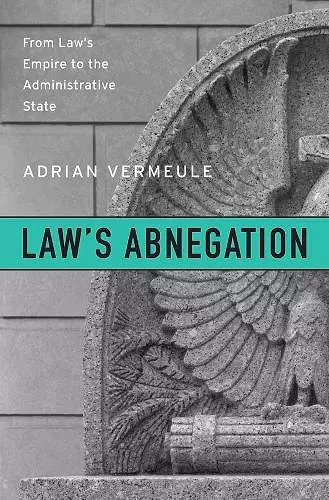Law’s Abnegation
From Law’s Empire to the Administrative State
Format:Hardback
Publisher:Harvard University Press
Published:24th Nov '16
Currently unavailable, and unfortunately no date known when it will be back

Ronald Dworkin once imagined law as an empire and judges as its princes. But over time, the arc of law has bent steadily toward deference to the administrative state. Adrian Vermeule argues that law has freely abandoned its imperial pretensions, and has done so for internal legal reasons.
In area after area, judges and lawyers, working out the logical implications of legal principles, have come to believe that administrators should be granted broad leeway to set policy, determine facts, interpret ambiguous statutes, and even define the boundaries of their own jurisdiction. Agencies have greater democratic legitimacy and technical competence to confront many issues than lawyers and judges do. And as the questions confronting the state involving climate change, terrorism, and biotechnology (to name a few) have become ever more complex, legal logic increasingly indicates that abnegation is the wisest course of action.
As Law’s Abnegation makes clear, the state did not shove law out of the way. The judiciary voluntarily relegated itself to the margins of power. The last and greatest triumph of legalism was to depose itself.
Law's Abnegation is a theoretically informed, analytically rigorous, and, above all, lawyerly interpretation of the law of the modern administrative state. But it is much more than that. Vermeule also brilliantly deconstructs confused and myopic alternative accounts and, most importantly, demonstrates how legal doctrine really works from an internal perspective. Built on the foundation of cases familiar to most administrative lawyers, his analysis is nevertheless revelatory concerning the field's core commitments, why those commitments make sense, and how they cohere across a wide range of seemingly disparate topics. -- Jerry L. Mashaw, Yale Law School
In this powerfully argued book, Vermeule shows that the administrative state, far from being ‘lawless,’ developed in accordance with the internal logic of the U.S. Constitution, and that by ‘working the law pure’ judges appropriately relegate themselves to the margins of the legal order. Both critics and supporters of the administrative state will learn much from his careful, imaginative, and non-polemical analysis. -- David Dyzenhaus, University of Toronto Faculty of Law
Vermeule's knowledgeable and unapologetic account of the theoretical foundations of judicial deference to administrative agencies will unsettle those who think of Congress and the courts as the dominant institutions in our legal system. But even skeptics will have to reckon with the breadth of his erudition and the rigor and forcefulness of the arguments in this impressive book. -- Ronald M. Levin, Washington University School of Law
With sophisticated but understated decision theory, political economy, legal philosophy, political science, and economics covertly lurking in the background, Vermeule relies heavily on traditional legal materials to demonstrate, convincingly, that the administrative state has grown to irreversible proportions with little constraint from the legal system. This book is essential reading not only for lawyers, but also for anyone who wishes to understand contemporary governance. -- Frederick Schauer, author of The Force of Law
- Winner of Award for Scholarship in Administrative Law 2017 (United States)
- Nominated for Scribes Book Award 2017
ISBN: 9780674971448
Dimensions: unknown
Weight: unknown
272 pages